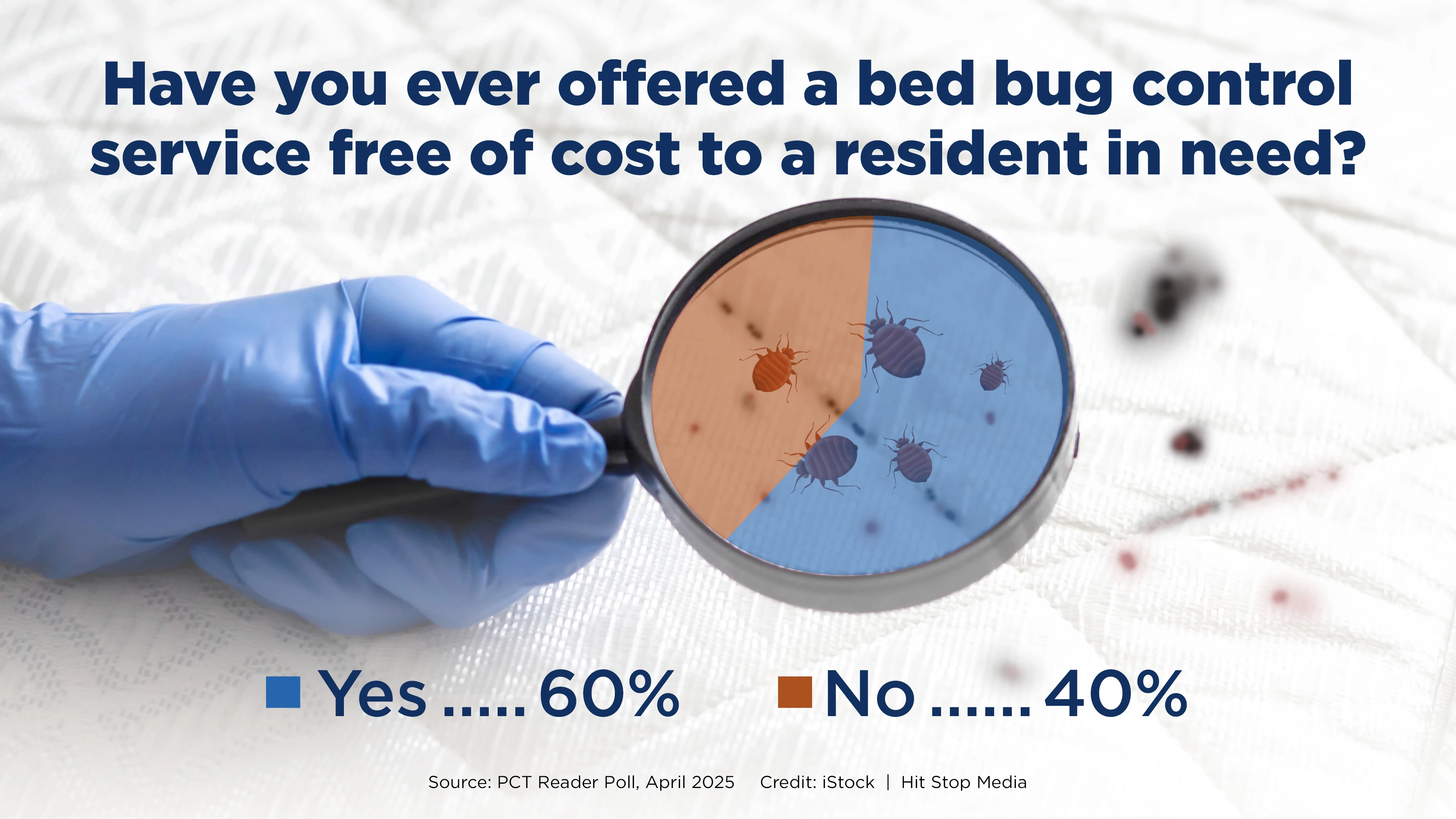Cats have long been known for their prowess at catching mice and other rodents. But, with a little motivation on the part of a PCO, they might be able to catch some new customers, too.
When Lynn Redner, office manager for Pestmaster Services in Kingston, N.Y., calls a certain customer, she says “Hi, it’s Lynn from Pestmaster. How’s Mr. Boots?”
“Because she knows the customer had taken the cat into the vet,” says Paul Alley, president of Alleymor, which operates the Kingston, N.Y., Pestmaster franchise and another in New Jersey.
By taking an extra minute or two to find about Mr. Boots and his infected paw, Lynn shows customers that she — and, by extension, the entire company — is interested in them, and can relate to them more genuinely, Alley says.
“We’re trying to become more that just a pest control company to the customer,” he says. “That’s what it’s all about: building relationships with customers.”
MEANINGFUL CUSTOMER SERVICE. To help grow his business, Alley goes to the requisite home and garden shows, sends press releases to the local newspaper and offers 24-hour emergency service. But he also sends a hand-written thank-you note to new customers and a condolence card when he learns that a customer has died.
But one of the best ways to get new customers and to show them you mean business is to offer free, on-site estimates, Alley says.
“Most of my competitors offer free phone estimates, but won’t drive out,” he says. “Do we lose money driving out to the customer? Absolutely. Did we build a rapport with that customer? Absolutely.”
And those relationships are pretty strong: Alley says his company has a cancellation rate of just one percent.
GROWING AND GROWING. Alley founded the company, a Pestmaster franchise about 100 miles north of New York City, in 2000, after spending more than a decade working in the industry in Florida and Texas.
Now, he has 4,800 accounts, and annual revenue of more than $1 million.
The New York office handles a territory of about a million people, and this January, the company set up a second franchise in New Jersey, covering another three counties and another million people. The company also is expanding its operations into golf course management and offers environmentally friendly products.
The company’s most high-profile contract is with the U.S. Military Academy at West Point, New York, a $1.25 million, five-year deal it won in 2001 and again last year. Alleymor also keeps the pests out of the Picatinny Arsenal, a 6,500-acre military testing facility about 30 miles northwest of Newark, N.J.
Last year, West Point earned STAR certification from the IPM Institute of North America; Picatinny will earn the same certification in May for adhering to principles of Integrated Pest Management.
Those two military contracts, along with a handful of school districts in New York, make up about half of Alleymor’s business. The other half are traditional “mom and pop” businesses and homeowners, Alley said.
UNDER-PROMISE AND OVER-DELIVER. Not one to shy away from a big job, in 2004, Alley signed on as a subcontractor to rid more than a million bats from a public housing complex in Savannah, Ga.
“You could drive through the neighborhood (and) you could smell the bats,” he says.
He and two service technicians lived there for three weeks in late 2004 and early 2005, and Alley stayed on for another five months as they built and installed more than 450 bat exclusion devices. He attached one-way doors under the dormers and soffits of the apartment roofs, and once the bats were gone, set to work removing the 165,000 square feet of contaminated insulation.
“You relocate 1.3 million bats, that’s a lot of bats,” he says.
Alley said, though, that regardless of size, the work on a contract has to be done well and on time. But to really impress — and keep — a customer, a pest management professional firm has to go beyond just keeping the bugs and bats out: he has to, in Alley’s words “under-promise and over-deliver.”
“If you tell the customer that you’re going to do something, make sure you do it, but go beyond that,” he says.
To keep his customers satisfied, Alley says, the successful pest management professional has to focus on the little things that a customer wouldn’t always expect him to do.
“A lot of it is attitude,” he says. “(If) your customers are just a number, and your company is just a company, then you won’t be able to build a relationship with clients.”
Earlier this year, one of Alley’s technicians was doing a walk-around inspection at a home, and saw that some of the gutters had become detached from the building. So, he put the gutters back, and then told the homeowner about it.
“Well, put it back on there. Pick it up and put it back on there,” Alley says. “If you fixed it, he’s going to love you for it. Tell the customer about it. Don’t just ignore it.”
He says technicians and companies can curry favor with customers and garner all sorts of “bonus points” in any number of ways: smelling what could be a gas leak and saying something about it; bringing the newspaper up to the front door; and always asking about Mr. Boots.
“You have to look at the big picture for customer service,” Alley says.
The author is assistant editor of PCT magazine.
Alleymor at a Glance
Name: Alleymor Inc., doing business as Pestmaster Services
Location: Based in Kingston, N.Y., with a new franchise that opened in January in Brick, N.J.
Leadership: Paul Alley, president
Revenues: $1 million annually from 4,800 accounts, including the West Point military academy
Most Problematic Pest in Alleymor’s area: Carpenter ants
Alleymor’s Tips And Tricks to Ramp Up Your Customer Base
- Send hand-written thank-you notes to new customers and condolences to the families of customers who pass away.
- Ask about a customer’s family, and remember what the customer says. Then, ask them specific questions when you contact them again.
- Give accurate and honest estimates for services.
- “Under-promise and over-deliver.” Keep an eye out for problems at a house or business — a suspected gas leak or broken gutters — and alert the homeowner or manager to them.

Explore the June 2007 Issue
Check out more from this issue and find your next story to read.
Latest from Pest Control Technology
- Target Specialty Products, MGK Partner for Mosquito Webinar
- Cockroach Control and Asthma
- FORSHAW Announces Julie Fogg as Core Account Manager in Georgia, Tennessee
- Envu Introduces Two New Innovations to its Pest Management Portfolio
- Gov. Brian Kemp Proclaimed April as Pest Control Month
- Los Angeles Ranks No. 1 on Terminix's Annual List of Top Mosquito Cities
- Kwik Kill Pest Control's Neerland on PWIPM Involvement, Second-Generation PCO
- NPMA Announces Unlimited Job Postings for Members







